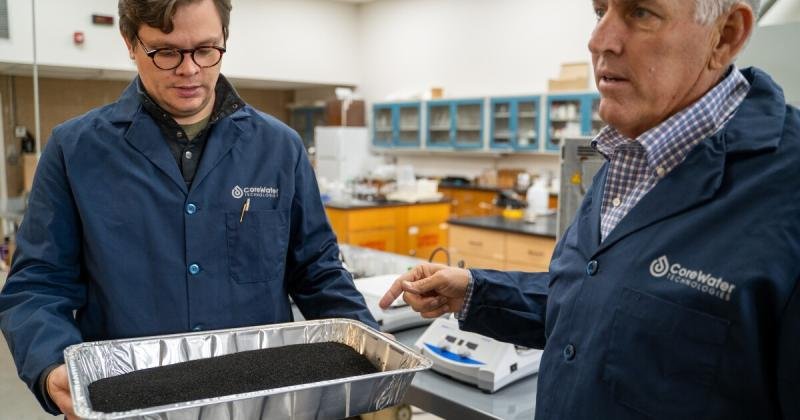Oberlin startup develops way to take 'forever chemicals’ out of drinking water.
Removing Forever Chemical, Forever.
Dennis Flood, right, notes that the Core+ material doesn't look any different from the granular activated carbon that's used to filter water at treatment plants. Holding the material is Cody Flood, CoreWater's director of research and Dennis's nephew.
Photo: Ygal Kaufman/Ideastream Public Media
Ideastream Public Media | By Tom Breckenridge
An Oberlin startup company is plying local connections, including the Cleveland Water Alliance, to land a share of the multibillion-dollar market to remove “forever chemicals” from the nation’s drinking water.
Three generations of the Flood family – Dennis J., Dennis M., and Cody – are principals at CoreWater Technologies, Inc., which has drawn $2.9 million in private investment so far. The company formed in 2019 to launch and license a chemical coating process that captures PFAS – poly- and perfluoroalkyl substances – and isolates them for destruction during water treatment.
Thousands of the “forever chemicals” are a public health threat because of their long-lasting and widespread nature. Nearly everyone has at least traces of the synthetic chemicals in their bodies due to their use in a familiar array of water-resistant, stain-resistant and non-stick products, including carpeting, clothing, cookware, cosmetics, electronics and packaging.
Earlier this year, an Ideastream special report detailed why and how PFAS taint Ohio and the Great Lakes.
Studies suggest PFAS are linked to increased cholesterol levels, increased risk of kidney or testicular cancer, decreases in infant birth weights, decreased vaccine response in children and increased risk of high blood pressure or preeclampsia in pregnant women, according to the Centers for Disease Control and Prevention.
In April, the U.S. Environmental Protection Agency issued stringent limits for six PFAS in drinking water. The low parts-per-trillion standards, equivalent to just drops of water in 20 olympic-sized swimming pools, will reduce PFAS exposure for approximately 100 million people, prevent thousands of deaths, and reduce tens of thousands of serious illnesses, according to the EPA.
The AWWA and others sued the EPA over the new regulations in the U.S. Court of Appeals in the Washington, D.C., Circuit. While the lawsuits play out, the new standards and deadlines have sparked innovation and investment in a variety of technologies and companies that aim to treat and destroy PFAS in the nation’s drinking water.

